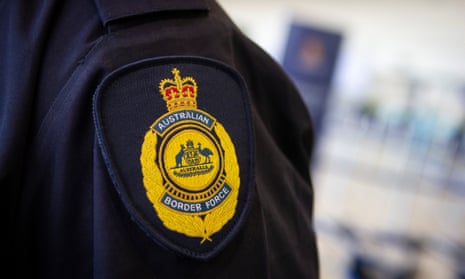Bullying and harassment “are normalised” in some sections of the Australian Border Force according to a damning report suggesting cultural issues are not confined to its marine unit.
The Australian Human Rights Commission’s Respect@Work report for the ABF concluded that “gender inequality persists in the ABF, creating unsafe work environments for some women”.
On Wednesday Guardian Australia revealed a secret AHRC report on the ABF’s marine unit had found that 100% of women who responded to a survey “witnessed sex discrimination, sexual … and/or sex-based harassment” and 78% had personally experienced that behaviour.
A broader Respect@Work report on the ABF, a summary of which has been seen by Guardian Australia, also details “examples of potentially unlawful conduct or inappropriate behaviour raised by ABF officers”.
These included alleged sexual discrimination, such as:
Comments from a team leader about wanting to “get rid of all his part-time workers” who were all women;
misogynistic and belittling comments by a male supervisor to a female officer to the effect that she belonged in the kitchen;
a female officer constantly told to smile while working on sensitive issues;
co-workers withholding information from a pregnant officer on the basis that she was not going to be around;
leaders commenting that some women are not suitable for certain roles because of their childcare responsibilities.
Alleged sexual harassment uncovered included: sexual images sent to female officers by a male officer, sexual innuendo seen as “banter” as commonplace in some teams, and “a senior male leader sending multiple junior female officers numerous, unwelcome personal messages and calls after hours”.
The report also warned of “bullying and other discriminatory conduct” such as “yelling, screaming and belittling behaviours by high-ranking officers” and “use of discriminatory language directed at clients from specific nationalities”.
The AHRC Respect@Work report was based on 30 focus groups with 143 participants, 29 interviews and workshops with 45 participants across a range of ABF groups including customs, detention management, maritime border command, and regional and remote operations.
“Some ABF officers expressed limited confidence in senior leadership’s ability or desire to address unlawful or inappropriate conduct,” the report said.
“They noted that consistent, visible action was needed, and that one‐off communication of expected behavioural standards is ineffective.”
In a section on culture, the report noted a “lack of consistency by senior leaders and people leaders [at the APS 4‐6 levels and EL1 and 2 levels] in setting standards expected in the workplace and in taking action to address unlawful conduct and other inappropriate behaviours”.
Despite some examples of “positive leadership”, the report also heard complaints of “a lack of leadership action and accountability in response to unlawful and inappropriate behaviour, with a tendency to ‘sweep matters under the carpet’ and leave officers to deal with their own matters” and that “individuals who engaged in unlawful or inappropriate conduct, including sexual harassment, were allowed to behave inappropriately without consequences”.
The AHRC found that “reporting options are perceived as unsafe, lacking confidentiality and lengthy, discouraging officers from reporting”.
“Fear of victimisation was raised as a further barrier to reporting.
“Officers spoke of negative career impacts and retaliation such as unfavourable rostering and reputational damage.”
“Women officers reporting sexual harassment spoke of facing dismissal of their allegations based on supposed ‘he said, she said’ scenarios, highlighting that reporting can lead to judgment and a lack of empathy towards those reporting.”
after newsletter promotion
Officers also complained of “a relatively high threshold” for formal sanctions and “a perception that current processes focus on individual incidents and not prior … or [a] series of incidents, which may highlight patterns of behaviour”.
The AHRC recommended the ABF develop “a monitoring and evaluation framework … to understand the prevalence of unlawful conduct and inappropriate behaviours”.
It also called for reporting systems to be redesigned “for a person-centred and trauma-informed practice”.
The Community and Public Sector Union national secretary, Melissa Donnelly, said the cultural issues “are deeply concerning, but not surprising”.
Donnelly said her members had been “working for years to raise and address issues that were allowed to fester and grow” but were “largely ignored or silenced”.
“Our members are relieved to see new leadership no longer turning a blind eye to the issues that plague their workplaces and compromise their safety.
“The union understands that this investigation is the first of many that will occur as the Department of Home Affairs works to address deeply entrenched cultural issues.”
Both the Respect@Work report and deep dive into the marine unit were produced by the AHRC as part of a five-year partnership with the ABF, which the commissioner, Michael Outram, said he had “proactively commissioned” in April 2022.
Outram responded to the reports by telling staff the reported behaviours were “confronting and disturbing and run counter to our ABF values”.
Outram has accepted all 42 recommendations of the reports and promised a “detailed implementation plan”.
“I am resolutely committed to working with the AHRC to establish ABF as an exemplar in providing a safe, equitable, diverse and inclusive culture and workplace,” he told Guardian Australia.
The home affairs minister, Clare O’Neil, said she “shared the commissioner’s concerns with the findings of the report and note the ABF has accepted all recommendations”.
